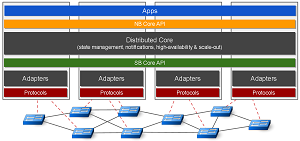News
New Open Network Operating System Released
The open source Open Network Operating System (ONOS) used in conjunction with new-age networking technologies such as software-defined networking (SDN) is out with a number of updates, including improved performance and more feature sets.
ONOS is an SDN networking OS for the service provider market, built with the goals of high performance, scale and availability. Following an alphabetical bird-naming scheme, ONOS version 1.2 is called Cardinal, following up on Avocet and Blackbird in a three-month release cadence. The project steward is ON.Lab, a nonprofit organization, and is funded by companies such as AT&T, NTT Communications, Cisco, Ericsson, Fujitsu, Huawei, Intel and NEC, among others.
"Cardinal adds comprehensive feature sets and performance improvements to enable a new variety of deployments and solution proof of concepts (PoCs)," ON.Lab said in a news release yesterday. "Cardinal delivers several significant enhancements, mainly in the areas of Application Intent Framework, southbound interfaces and new distributed core features and capabilities."
The Application Intent Framework is a subsystem that lets applications specify their network control desires via policy-based directives called intents instead of through mechanisms. "Cardinal improves performance for flow operations, application intent processing and network topology maintenance by more than 25 percent," ON.Lab said.
 [Click on image for larger view.]
ONOS Distributed Architecture (source: ON.Lab)
[Click on image for larger view.]
ONOS Distributed Architecture (source: ON.Lab)
The Application Intent Framework now features extensions to add MPLS and tunneling support to support more SDN applications. "A new flow-objective subsystem in the distributed core enables device agnostic SDN deployment," ON.Lab stated. "It allows apps to use a variety of OpenFlow switches with support for multiple tables without being concerned about the device specific details. It is definitely a big step forward towards the inter-operability and elimination of the solution silos that exist today."
Deployment is easier, ON.Lab said, because of lessons learned in PoC demonstrations. For example, working with partners including the Open Networking Foundation (ONF), ON.Lab successfully deployed an ONOS-based SDN peering router hosted by AARNet and CSIRO in Australia that communicates with a Vandervecken SDN controller stack housed at ESnet in California.
ON.Lab said it was going to demonstrate other PoCs at the upcoming Open Networking Summit conference, including "several new uses by enabling the central office to be re-architected as a datacenter (CORD)."
"The ONOS project continues the effort in collaborating with other open source projects such as ONF and [Open Platform for Network Functions Virtualization] OPNFV," ON.Lab said. "Recently ONOS officially joined the effort for one of the OPNFV use cases. In addition, ONOS will join ONF to showcase some of the important solution POCs together at ONS2015 as well." The ONS2015 conference will be held June 15-18 at the Santa Clara Convention Center.
About the Author
David Ramel is an editor and writer at Converge 360.